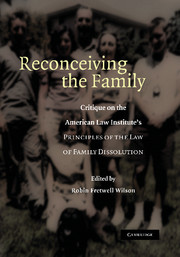 Reconceiving the Family
Reconceiving the Family Book contents
- Frontmatter
- Contents
- Acknowledgments
- Foreword, by Mary Ann Glendon
- List of Contributors
- Introduction
- PART ONE FAULT
- PART TWO CUSTODY
- PART THREE CHILD SUPPORT
- PART FOUR PROPERTY DIVISION
- PART FIVE SPOUSAL SUPPORT
- PART SIX DOMESTIC PARTNERSHIP
- PART SEVEN AGREEMENTS
- PART EIGHT JUDICIAL AND LEGISLATIVE PERSPECTIVES
- PART NINE INTERNATIONAL REFLECTIONS
- Afterword: Elite Principles: The ALI Proposals and the Politics of Law Reform, by Carl E. Schneider
- Index
Afterword: Elite Principles: The ALI Proposals and the Politics of Law Reform, by Carl E. Schneider
Published online by Cambridge University Press: 25 January 2010
- Frontmatter
- Contents
- Acknowledgments
- Foreword, by Mary Ann Glendon
- List of Contributors
- Introduction
- PART ONE FAULT
- PART TWO CUSTODY
- PART THREE CHILD SUPPORT
- PART FOUR PROPERTY DIVISION
- PART FIVE SPOUSAL SUPPORT
- PART SIX DOMESTIC PARTNERSHIP
- PART SEVEN AGREEMENTS
- PART EIGHT JUDICIAL AND LEGISLATIVE PERSPECTIVES
- PART NINE INTERNATIONAL REFLECTIONS
- Afterword: Elite Principles: The ALI Proposals and the Politics of Law Reform, by Carl E. Schneider
- Index
Summary
God forbid I should insinuate anything derogatory to that profession which is another priesthood, administrating the rights of sacred justice. But whilst I revere men in the functions which belong to them, and would do as much as one man can do to prevent their exclusion from any, I cannot, to flatter them, give the lie to nature. They are good and useful in the composition; they must be mischievous if they preponderate so as virtually to become the whole. Their very excellence in their peculiar functions may be far from a qualification for others. It cannot escape observation that when men are too much confined to professional and faculty habits and, as it were, inveterate in the recurrent employment of that narrow circle, they are rather disabled than qualified for whatever depends on the knowledge of mankind, on experience in mixed affairs, on a comprehensive, connected view of the various, complicated, external and internal interests which go to the formation of that multifarious thing called a state.
Edmund Burke Reflections on the Revolution in FranceOf This Time, of That Place
It was the expert who benefited most directly from the new framework of politics. The more intricate such fields as the law and the sciences became, the greater the need for men with highly developed skills. The more complex the competition for power, the more organizational leaders relied on experts to decipher and to prescribe. Above all, the more elaborate men's aspirations grew, the greater their dependence upon specialists who could transcribe principles into policy… .[…]
- Type
- Chapter
- Information
- Reconceiving the FamilyCritique on the American Law Institute's Principles of the Law of Family Dissolution, pp. 489 - 506Publisher: Cambridge University PressPrint publication year: 2006
- 1
- Cited by
